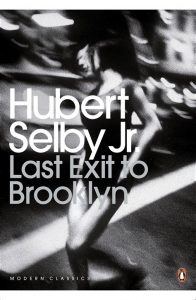I finished Last Exit To Brooklyn, by Hubert Selby Jr., a few weeks ago by now. I am well into Tender Is The Night by F. Scott Fitzgerald. I actually enjoyed reading the book quite a bit and there were a few situations where I thought the book was hard to put down. Here’s a picture:

There is not a single main protagonist and all characters described in detail are practically anti-heroes. The book deals with a number of stories, each focusing on a single individual or a group of people and all these protagonists, the reader learns, are somehow connected with one another. One story sometimes begins were another ends or the same characters appear in different stories, yet each story is in itself conclusive.
The characters are simple people, ordinary workers, bar patrons, wives and transvestites. Many display a low moral code, cheat, lie or otherwise take advantage of others and one another. There is a fair amount of quite graphic descriptions of drug use, sex and violence. In some cases, it’s borderline pornographic and sometimes even that threshold gets crossed.
I guess I enjoyed reading this book more than the last is that I find the characters more believable. I see their problems and the way they struggle through life more convincing than the musings of the university professors. And while the protagonists don’t deal or overcome their problems – there’s no catharsis – the book makes you feel their emotions and take part in their lives.
What is also quite remarkable about the book is the style it is written in. Huber Selby didn’t think much about punctuation, spelling, let alone capitalisation. There’s nothing to indicate when somebody starts speaking, no quotation marks and words that should be spelt separately are joined and misspelt. The author also uses a lot of profanity and slang, slang which probably was more common for the time it was written in. Some words, or rather their meanings, is occasionally hard to guess. But I think this makes the book more enjoyable to read to me. I feel like I learn something more and I am part of the time it takes place.
Last Exit To Brooklyn is, all in all, very enjoyable to read, IMHO.
So I’m already in the last quarter of Tender Is The Night and I hope to finish it before I’m going away to Israel. It is a good read, I enjoy it more than Eating People Is Wrong, although the content is much harder to understand and to read through than Last Exit To Brooklyn.
I’ll follow up with my comments on it shortly…

